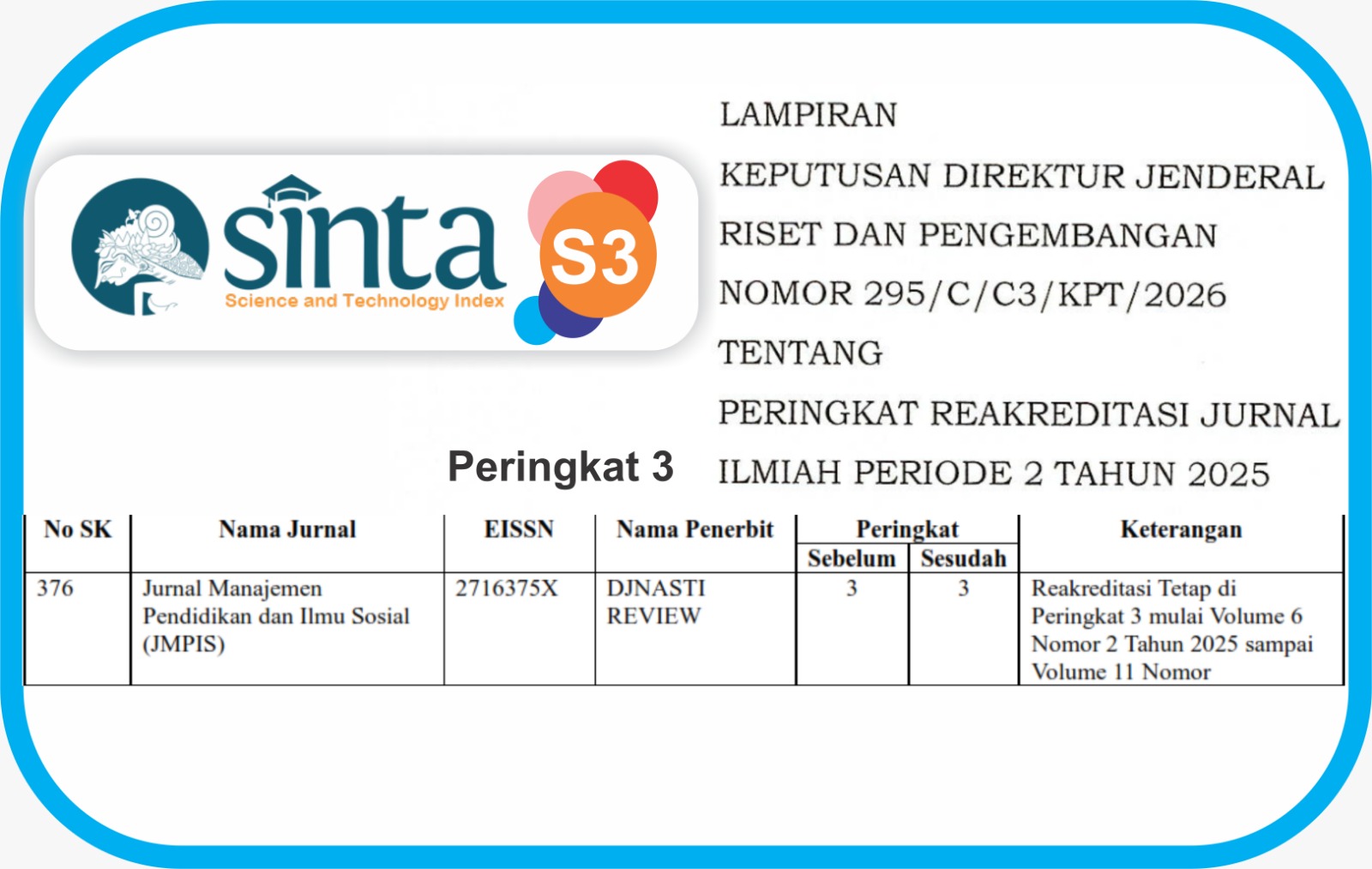Kurikulum Pendidikan di Indonesia: Menjawab Kebutuhan Global di Tengah Tantangan Lokal
DOI:
https://doi.org/10.38035/jmpis.v6i3.4542Keywords:
Indonesia, Kurikulum Pendidikan, Globalisasi, Kearifan LokalAbstract
Penelitian ini bertujuan untuk menggali pemahaman orang tua siswa mengenai penerapan kurikulum yang mengintegrasikan nilai-nilai global dan lokal di SMA Cinta Bangsa, Provinsi Aceh Tenggara. Penelitian ini menggunakan pendekatan deskriptif kualitatif dengan pengumpulan data melalui wawancara semi-terbuka dengan orang tua siswa dan observasi langsung terhadap kegiatan belajar mengajar. Hasil penelitian menunjukkan bahwa mayoritas orang tua merasa kurikulum saat ini lebih fokus pada nilai lokal dan kurang mempersiapkan siswa untuk menghadapi tantangan global. Tantangan utama yang dihadapi adalah keterbatasan sumber daya di sekolah, baik fasilitas maupun pelatihan guru. Penelitian ini menyarankan perlunya pembaruan kurikulum yang lebih seimbang antara pengajaran nilai lokal dan global, serta peningkatan pelatihan bagi guru agar dapat mengimplementasikan kurikulum yang mengintegrasikan kedua aspek tersebut dengan efektif. Temuan ini diharapkan dapat memberikan wawasan untuk perbaikan kurikulum pendidikan Indonesia dalam menghadapi tantangan global tanpa mengabaikan kearifan lokal.
References
Abdillah, F. (2023). Civic education pre-service teachers’ attitudes toward the digital learning environment. In AIP Conference Proceedings (Vol. 2621, Issue 1). https://doi.org/10.1063/5.0142283
Barus, A. (2023). Dispositions as an Important Component in Computing Curriculum in IT Del. In Proceedings of 2023 IEEE International Conference on Data and Software Engineering, ICoDSE 2023 (pp. 85–90). https://doi.org/10.1109/ICoDSE59534.2023.10291337
Bortel, T. Van. (2022). The mental health experiences of ethnic minorities in the UK during the Coronavirus pandemic: A qualitative exploration. Frontiers in Public Health, 10. https://doi.org/10.3389/fpubh.2022.875198
Cengiz, G. H. G. (2022). According to Archival Documents the Problem of Alimony in Ottoman Empire from the Late 19th Century to the Early 20th Century. Osmanli Mirasi Arastirmalari Dergisi, 9(25), 541–565. https://doi.org/10.17822/omad.2022.227
Dewi, E. (2024). STEM approach in middle school mathematics learning: What is teacher’s perception of it? In AIP Conference Proceedings (Vol. 2622, Issue 1). https://doi.org/10.1063/5.0133954
Fathoni, A. M., Sulaeman, M., Azizah, E. A. N., Styawati, Y., & Ramadhan, M. U. C. (2024). The New Direction of Indonesian Character Education: Bullying, Moral Decadence, and Juvenile Delinquency. Jurnal Pendidikan Agama Islam, 21(1), 22–39. https://doi.org/10.14421/jpai.v21i1.7759
Frananda, M., Kurnia, M. D., Jaja, J., & Hasanudin, C. (2023). Kurikulum merdeka belajar kampus merdeka untuk memenuhi kebutuhan pembelajaran abad 21. Jurnal Pendidikan Edutama, 10(1), 1–10.
Hamami, T. (2022). A holistic–integrative approach of the Muhammadiyah education system in Indonesia. HTS Teologiese Studies / Theological Studies, 78(4). https://doi.org/10.4102/hts.v78i4.7607
Hossen, M. S. (2023). Exploring barriers to accessing healthcare services for older indigenous people in the Chittagong Hill Tract, Bangladesh. AIMS Public Health, 10(3), 678–697. https://doi.org/10.3934/publichealth.2023047
Husna, N. (2021). Development of student worksheets on ethnomathematics-based trigonometry through Project-Based Learning models. In Journal of Physics: Conference Series (Vol. 1882, Issue 1). https://doi.org/10.1088/1742-6596/1882/1/012071
Irawan. (2023). FACING GLOBAL CHALLENGES AND A NEW POST PANDEMI ERA IN INDONESIA: CURRICULUM CHANGES AND INNOVATIONS IN THE BACHELOR OF ISLAMIC EDUCATION MANAGEMENT PROGRAM. Revista de Gestao Social e Ambiental, 17(7). https://doi.org/10.24857/rgsa.v17n7-025
Islami, R. A. Z. El. (2022). A Comparison of School Science Curricula of Indonesia, Vietnam, and Thailand. Asia-Pacific Social Science Review, 22(2), 63–82. https://www.scopus.com/inward/record.uri?partnerID=HzOxMe3b&scp=85133362029&origin=inward
Kolmar, A. (2022). Clinician End-of-Life Experiences With Pediatric Muslim Patients at a US Quaternary Care Center. Journal of Pain and Symptom Management, 63(5), 673–679. https://doi.org/10.1016/j.jpainsymman.2022.01.005
Kurnia, A. M. B. (2022). Deradicalization Model Through Islamic Education Curriculum in Indonesia, Spain, And Nigeria. Res Militaris, 12(2), 428–439. https://www.scopus.com/inward/record.uri?partnerID=HzOxMe3b&scp=85141156263&origin=inward
Meryansumayeka. (2020). Secondary students’ higher-order thinking skills in solving PISA- like mathematical tasks. In Journal of Physics: Conference Series (Vol. 1480, Issue 1). https://doi.org/10.1088/1742-6596/1480/1/012034
Muhammad, A. R. (2023). Opportunities and challenges faced by State Islamic Tertiary Education Institutions in 4.0 Industrial Era. Multidisciplinary Science Journal, 5(3). https://doi.org/10.31893/multiscience.2023036
Paulo, C. M. (2023). Barriers and facilitators to physical activity prehabilitation in patients with kidney cancer. European Journal of Oncology Nursing, 65. https://doi.org/10.1016/j.ejon.2023.102333
Rahmawati, Y. (2020). The integration of culturally responsive transformative teaching to enhance student cultural identity in the chemistry classroom. Universal Journal of Educational Research, 8(2), 468–476. https://doi.org/10.13189/ujer.2020.080218
Rahmawati, Y., Agustin, M. A., Sihombing, S. N., Mardiah, A., & Iriyadi, D. (2020). Students empowerment in chemistry learning through the integration of dilemma teaching pedagogy in plastic waste. Journal of Physics: Conference Series, 1521(4). https://doi.org/10.1088/1742-6596/1521/4/042079
Rasheed, Q. S. (2021). An Alternative Proposal of Justice: Muslim Women Activists and Socio-Legal Realities in India. Journal of International Women’s Studies, 22(1), 270–292. https://www.scopus.com/inward/record.uri?partnerID=HzOxMe3b&scp=85101388543&origin=inward
Sesilia, E., Nadana, M. S., Azzahra, D. D., Hudi, I., Pangestika, M. D., Nisak, N., Nabila, S., & Jibril, F. (2024). Peran Pendidikan Pancasila Di Era Globalisasi Dalam Pembentukan Karakter Mahasiswa. Jurnal Review Pendidikan Dan Pengajaran, 7(1), 2013–2016.
Siahaan, M. M. L. (2023). Study on preservice mathematics teacher: An analysis of numeracy literacy by open-ended task in geometry. In AIP Conference Proceedings (Vol. 2595). https://doi.org/10.1063/5.0123817
Thomas, E. C. (2022). Treatment decision-making needs among emerging adults with early psychosis. Early Intervention in Psychiatry, 16(1), 78–90. https://doi.org/10.1111/eip.13134
Witjaksana, B., Purwanti, A., Fathoni, T., & Dewi, D. D. (2024). Increasiation Economic Management Literacy For The Community Through The Independent Entrepreneurship Program. Community Development Journal: Jurnal Pengabdian Masyarakat, 5(4), 6207–6215.
Yoo, L. (2022). Teaching Presence, Self-Regulated Learning and Learning Satisfaction on Distance Learning for Students in a Nursing Education Program. International Journal of Environmental Research and Public Health, 19(7). https://doi.org/10.3390/ijerph19074160
Downloads
Published
How to Cite
Issue
Section
License
Copyright (c) 2025 Rinovian Rais, Nurianti Sitorus, Sungguh Ponten Pranata

This work is licensed under a Creative Commons Attribution 4.0 International License.
Hak cipta :
Penulis yang mempublikasikan manuskripnya di jurnal ini menyetujui ketentuan berikut:
- Hak cipta pada setiap artikel adalah milik penulis.
- Penulis mengakui bahwa Jurnal Manajemen Pendidikan dan Ilmu Sosial (JMPIS) berhak menjadi yang pertama menerbitkan dengan lisensi Creative Commons Attribution 4.0 International (Attribution 4.0 International CC BY 4.0) .
- Penulis dapat mengirimkan artikel secara terpisah, mengatur distribusi non-eksklusif manuskrip yang telah diterbitkan dalam jurnal ini ke versi lain (misalnya, dikirim ke repositori institusi penulis, publikasi ke dalam buku, dll.), dengan mengakui bahwa manuskrip telah diterbitkan pertama kali di Jurnal Manajemen Pendidikan dan Ilmu Sosial (JMPIS).











































































